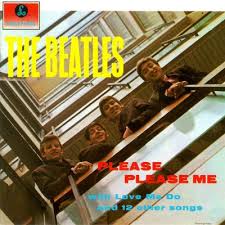 Album: Please Please Me
Album: Please Please MeRelease Date: March 22 1963
I often disagree with reviews from Pitchfork Media, but their critiques of the Beatles remasters offer some nice insights, or at the very least a valuable framework for viewing each album.
For Please Please Me, Pitchfork's Tom Ewing describes it as a way to deliver the titular hit single while also teasing the buying public with a large sample of what the band played through in their live shows. Based on what I know of their history, this makes sense. It fits in nicely with the story of how the album was recorded in one long session, using very few takes. Please Please Me was largely a promotional vehicle, a quick and cheap way to get the band out there to see what, if anything, would stick with listeners. It is perhaps only due to the band's talent that such a release is as good as it is.
I agree with Ewing's comment that the entire album can be danced to, which makes perfect sense if the album consists of live show staples. I also agree that the album feels cohesive despite being a mix of originals and covers. There's an overall sound of twangy guitars and sweet, syrupy harmonies which is only occasionally interrupted. But despite these positive qualities, the album doesn't always click with me. There are fourteen songs, which is right in line with the majority of Beatles albums, yet it's the only one where I end up wondering when it will end. I look at the track list, and think to myself, "These are all great songs. Why am I so impatient to get through them?" That's when I have to admit to myself that I don't like "Misery" or "Ask Me Why", or even "Please Please Me" itself nearly as much as I think I do. And the tracks that I don't like are scattered in such a way that they kill any momentum the album manages to work up.
But what's most striking to me about Please Please Me is that no song goes over three minutes in length, yet each feels longer than they actually are. My guess, as a budding writer, is that the dance hall nature of this early material leads to a heavier emphasis on vocal harmony over strong instrumentation. To my ear, all the long phrases and "woohs" and "ahhs" make even the songs with a brisk tempo feel slower than they are. There are no hooks, no wild shifts in tone, because these qualities aren't apt to dance.
Thankfully, when Please Please me does work, it clearly demonstrates that the Beatles were playing with genius. "I Saw her Standing There" may be the greatest first track in the history of rock. The beat is fast, every instrument is clear and perfectly used, and the harmonies are golden. On the other end of the record, their cover of "Twist and Shout" is so raw, at once both surprising yet seemingly appropriate. Even when dealing with covers, the Beatles knew how to combine the intent of the original with their own personal spin, in this case creating a definitive version of the classic tune. The same can be said for their cover of "Boys" by The Shirelles, which somehow comes to life on the Rock Band game tie-in. As for other originals, "Do you Want to Know a Secret?" always wins me with its charm, and I'd easily take "Love Me Do" over "Please Please Me" as the best song to identify the record with.
There's a lot of fun in Please Please Me, but don't be afraid to pick and choose on this one. There are better whole album experiences to be had.
No comments:
Post a Comment